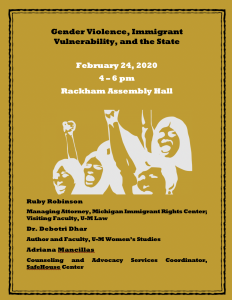Presented By: Women's and Gender Studies Department
Gender Violence, Immigrant Vulnerability, and the State: A Symposium

Speakers:
Ruby Robinson
Managing Attorney, Michigan Immigrant Rights Center and Winter Faculty, U-M Law
Adriana Mancillas
Counseling and Advocacy Services Coordinator, SafeHouse
Debotri Dhar
Faculty, Women's Studies
While globalization is understood as a contemporary moment marked by an unprecedented volume of travel – goods, capital, labor, images, ideas, knowledge – what is perhaps unprecedented is not so much the travel itself, but that “world travelers” were historically white and male. With an increase in postcolonial migrations – whether forced, voluntary, or in between – of individuals and communities from the Global South to the Global North, has colonialism’s unidirectional plunder under the guise of a “civilizing mission” now given way to immigrants of color being framed as invaders, pollutants, and burdens on the state in order to maintain discursive hierarchies of race, social class, and nation? In this post/colonial era, what, then, is the relationship between immigrant vulnerability and gender violence?
In the United States, a plethora of individuals and institutions have advocated for the rights of vulnerable immigrants, resulting in Acts such as VAWA and related remedial measures for low income victims of gender-based violence (including domestic violence and sexual assault.) What are some of the strengths and challenges of these legal mechanisms? With many citizen female victims of violence already ending up as defendants in the criminal justice system, where does it leave vulnerable immigrant women, especially in cases where the perpetrators are not “their” men but members of an elite white citizenry? What about the immigrant men of color, who are already framed as violent in the nation’s political imagination? And transgender and queer immigrants - even more marginalized, seldom talked about? In other words, can the gender, race, social class, and immigration status of victims and perpetrators of gender-based violence have an impact on legal outcomes? As the nation debates its immigration policies, what services can local and national organizations for survivors of gender violence offer, in more practical terms, to immigrants and vulnerable others?
The 3 panelists of this small 2-hour symposium will address the above interdisciplinary themes in their presentations. The discussion will be followed by audience Q+&A and an Indian dinner. The event will be free and open to the public.
Ruby Robinson
Managing Attorney, Michigan Immigrant Rights Center and Winter Faculty, U-M Law
Adriana Mancillas
Counseling and Advocacy Services Coordinator, SafeHouse
Debotri Dhar
Faculty, Women's Studies
While globalization is understood as a contemporary moment marked by an unprecedented volume of travel – goods, capital, labor, images, ideas, knowledge – what is perhaps unprecedented is not so much the travel itself, but that “world travelers” were historically white and male. With an increase in postcolonial migrations – whether forced, voluntary, or in between – of individuals and communities from the Global South to the Global North, has colonialism’s unidirectional plunder under the guise of a “civilizing mission” now given way to immigrants of color being framed as invaders, pollutants, and burdens on the state in order to maintain discursive hierarchies of race, social class, and nation? In this post/colonial era, what, then, is the relationship between immigrant vulnerability and gender violence?
In the United States, a plethora of individuals and institutions have advocated for the rights of vulnerable immigrants, resulting in Acts such as VAWA and related remedial measures for low income victims of gender-based violence (including domestic violence and sexual assault.) What are some of the strengths and challenges of these legal mechanisms? With many citizen female victims of violence already ending up as defendants in the criminal justice system, where does it leave vulnerable immigrant women, especially in cases where the perpetrators are not “their” men but members of an elite white citizenry? What about the immigrant men of color, who are already framed as violent in the nation’s political imagination? And transgender and queer immigrants - even more marginalized, seldom talked about? In other words, can the gender, race, social class, and immigration status of victims and perpetrators of gender-based violence have an impact on legal outcomes? As the nation debates its immigration policies, what services can local and national organizations for survivors of gender violence offer, in more practical terms, to immigrants and vulnerable others?
The 3 panelists of this small 2-hour symposium will address the above interdisciplinary themes in their presentations. The discussion will be followed by audience Q+&A and an Indian dinner. The event will be free and open to the public.